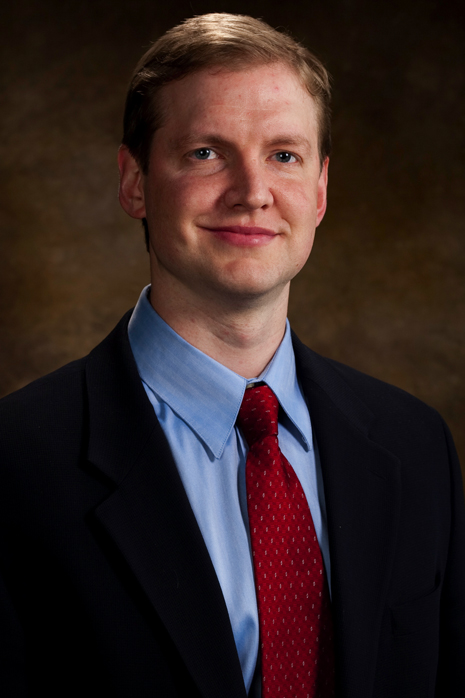FAYETTEVILLE, Ark. – Biomedical engineering professor David Zaharoff has been awarded a Transition Career Development Award by the National Cancer Institute to further his research on Interleukin-12, a powerful cytokine that shows great promise for therapeutic treatment of numerous types of cancer.
The award, which totals $511,368 over three years, is given to fewer than 15 investigators nationwide each year. It is the first time the National Cancer Institute has given this type of award in Arkansas, and it is the only Transition Career Development Award from any of the National Institutes of Health to be given to a researcher at the University of Arkansas.
The primary objective of the Transition Career Development Award is to help stabilize career tracks of promising investigators while establishing their first independent, cancer-related research programs. The award provides three years of salary – up to $100,000 per year – and up to $50,000 in direct costs per year for research and development expenses.
Interleukin-12 is a potent protein that allows communication between cells and helps regulate immunity – with significant clinical toxicities. To reduce clinical toxicities while maintaining or improving the antitumor efficacy of Interleukin-12, researchers in Zaharoff’s lab developed a novel biomaterials-based delivery system for targeted application. They demonstrated that combining Interleukin-12 with chitosan, a viscous biopolymer, can retain Interleukin-12 in the tumor microenvironment; eradicate established colorectal, bladder and pancreatic tumors; and generate durable protection from tumor recurrence. These effects could not be reproduced by either chitosan or Interleukin-12 alone.
In 2009, Zaharoff published findings from studies of chitosan/Interleukin-12 on bladder tumors in mice. In these studies, 88 to 100 percent of mice with bladder tumors were cured after four treatments within the bladder. The researchers found that anti-tumor responses following chitosan/Interleukin-12 treatments were durable and provided complete protection from bladder tumor recurrence. Results were published in the August 2009 issue of Cancer Research, which may be found at http://cancerres.aacrjournals.org/.
Zaharoff received extensive training in drug delivery applications at Duke University and tumor immunology at the National Cancer Institute. At the University of Arkansas, he is part of the biomedical engineering program, a rapidly expanding program committed to achieving national recognition.
“The biomedical research community at the University of Arkansas is a vibrant, highly collaborative group that provides great opportunity for intellectual stimulation, collaborative interaction and equipment sharing,” Zaharoff said. “This award will help us establish an academic laboratory that will focus on the development of novel delivery systems for vaccines and cancer immunotherapies.”
Zaharoff is holder of the Twenty-First Century Professorship in Biomedical Engineering. He is director of the Laboratory of Vaccine and Immunotherapy Delivery and a member of the Winthrop P. Rockefeller Cancer Institute at the University of Arkansas for Medical Sciences.
Topics
Contacts
David Zaharoff, assistant professor
Biological and agricultural engineering
479-575-2005,
Matt McGowan, science and research communications officer
University Relations
479-575-4246,
